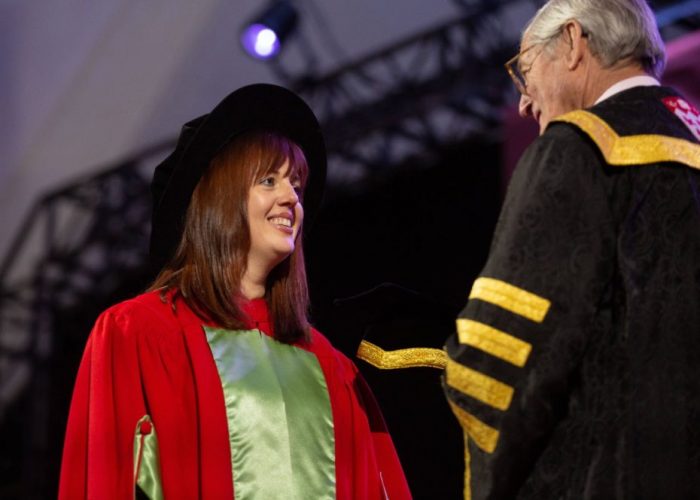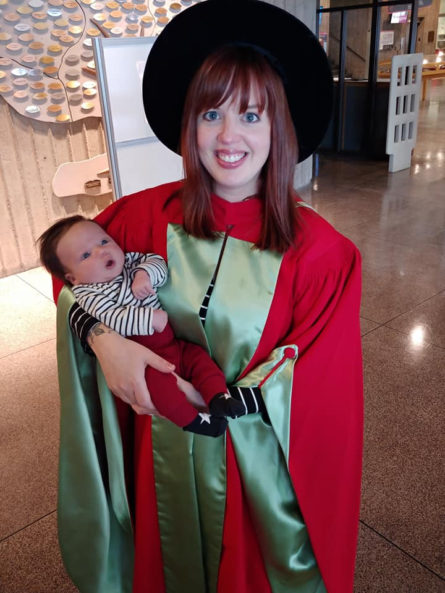
By François Shalom, The Reporter
Nichole Austin was not even aware she was up for an award, much less the Governor General’s Gold Medal, given to the top doctoral thesis across McGill. But the honour was indeed bestowed on her – a distinction she learned about only after standing in line to collect her seating assignment for the Health Sciences Convocation on May 28.
Lorraine Chalifour, Associate Dean of graduate and postdoctoral studies, said in her conferral letter that Austin was “given this Medal in recognition of your exemplary academic record, the excellence of your thesis and the significance of your research.”
The award was for an “outstanding McGill graduate receiving a Doctoral degree in 2018-2019 in any discipline,” Chalifour wrote.
Austin, a post-doctoral researcher in the Department of Epidemiology, Biostatistics and Occupational Health, wrote her PhD thesis on so-called TRAP laws; Targeted Regulations on Abortion Providers, designed to get around access to abortion laws in many U.S. states by imposing a plethora of restrictions – ranging from picayune to draconian – on the providers.
Abortion controversy in the U.S.
If timing is everything, Austin could not have picked a better time to come out with her thesis, which she started four years ago. Various U.S. states have recently adopted extreme abortion laws that Austin called “obviously blatantly unconstitutional” in a concerted bid to force the issue up to the U.S. Supreme Court, now controlled by conservatives.

Many fear the ultimate goal is to overturn the 1973 landmark case of Roe v. Wade that legalized abortions in the U.S. In the early 1990s, however, another verdict allowed states to restrict abortions under certain circumstances. Since then, there has been a constant drip-drip of cases brought before courts in various states to curtail abortions, many of them successful.
Professor Sam Harper of the Department of Epidemiology, Biostatistics and Occupational Health, who supervised both her masters’ degree thesis and her doctoral thesis, Tweeted he was “beyond thrilled and proud,” of Austin’s award.
“(Nichole)’s a rock star, a tremendous scholar – and a wonderful human being. Excited to see where her future work will go…,” Harper wrote.
Stringent requirements placed on abortion providers
Austin, a 36-year-old Boston native – and mother of a seven-week-old – said in an interview that when “demand-side laws” that targeted the abortion-seeking woman directly, such as requiring ultra-sound tests and mandatory counselling, proved ineffective, states switched tactics and introduced “supply-side laws” that target abortion providers – TRAP laws.
These can be petty and harassing – such as regulating the waiting room temperature or the mandatory width of a clinic’s hallways. But Austin concentrated on two important types of TRAP laws: ASC, or ambulatory surgical centre laws, and admitting privilege laws.
The former stipulate that any abortion facility be equipped in compliance with the state’s ASC requirements. Those requirements, however, substantially exceed what is needed to perform abortions, one of medicine’s safest procedures. The latter require the abortion-providing physician to have full admitting privileges at a nearby hospital.
“The problem with that,” said Austin, “is that a lot of hospitals in the U.S. are religiously affiliated and unlikely to grant those admitting privileges to an abortion provider. It’s also generally challenging and unnecessary for an abortion provider to actually hold those privileges at a hospital.”
The problem is further compounded by distance provisions. Some laws demand that a physician have admitting privileges at a hospital within, say, 30 miles of where he or she practices. Many abortion facilities, however, are in rural areas in huge states like Texas, where it’s not feasible to establish a practice near a hospital.
“So, we saw a huge [about 50 per cent] loss of rural providers because these laws just kind of cut them off at the source,” Austin noted. “The goal here is basically to cut off services at the root.”
Return of back-alley abortions?
Austin wanted to understand whether these restrictive laws were having an effect on the incidence of abortions, which have declined dramatically for nearly 30 years, notably among teenage girls, to an all-time low.
One obvious explanation for the decline is greater availability of and awareness about high-quality contraception, Austin said. But other factors may include highly dangerous self-induced abortions and the likelihood that teenagers are having less sex (or less procreative sex). The return of the “back-alley abortion” syndrome as a result of restrictive laws is impossible to quantify, she added, due to scant data information available on maternal morbidity.
“We’re still not exactly sure why it’s at an all-time low.”
“The expectation when I started this work was that states would continue to repeal these laws and the ones that existed would be overturned. But with what’s been happening, I think that states might hold on to these laws a bit longer than expected. The current initiatives… are on a totally different plane.”
“You cannot end abortion, just safe abortion.”
June 6 2019
